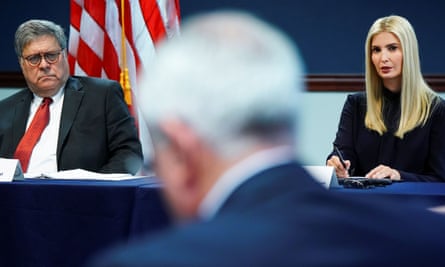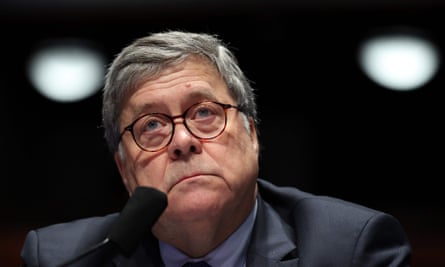Extract from The Guardian
The attorney general has been giving misleading statements on election integrity, and, critics say, has a deep sense of mission about re-electing the president
Last modified on Sat 26 Sep 2020 04.25 AEST
Donald Trump’s astonishing suggestion at a campaign rally last weekend that the US president will deploy government lawyers to try to hit the brakes on the counting of ballots on election night relies on the complicity of one federal official more than any other.
That official is the attorney general, William Barr, who, as the leader of the justice department, directs the army of government lawyers who would sue to halt the counting of votes.
Conveniently for Trump’s stated plan, Barr appears not only ready to acquiesce, he seems eager to bring the lawsuits, having laid groundwork for challenging the election with weeks of misleading statements about the integrity of mail-in voting.
To some observers, the attorney general appears to have also laid the groundwork for a further alarming step, one that would answer the question of what action the Trump administration is prepared to take if a contested election in November gives rise to large new protests.
In order for Trump to steal the election and then quell mass demonstrations – for that is the nature of the nightmare scenario now up for open discussion among current and former officials, academics, thinktankers and a lot of other people – Trump must be able to manipulate both the levers of the law and its physical enforcement.
In Barr, Trump not only gets all of that, critics say, but he also enjoys the partnership of a man whose sense of biblical stakes around the election imbues him with a deep sense of mission about re-electing Trump.
In a break with the relative reticence of his first 18 month in office, Barr has laid out his own thinking with a series of recent speeches, interviews and internal discussions. Even routine critics of Barr have been struck by the Barr that has now revealed himself.
The erstwhile mild-mannered Washington lawyer has been spouting attacks on election integrity and hostility toward street protests while describing, in explicitly religious terms, an epochal showdown between the forces of “moral discipline and virtue” – which he believes he represents – and “individual rapacity” manifesting as social chaos, embodied by leftwing protesters among others.
“His abuses have only escalated as we have gotten closer and closer to the election, and as the president has felt more and more politically vulnerable,” said Donald K Sherman, the deputy director of the Citizens for Responsibility and Ethics in Washington watchdog group, which has called for Barr’s impeachment.
“I can’t put it more plainly than this: the attorney general is a threat to American citizens having free and fair access to the vote, and is a threat to American having their votes counted.”
In recent weeks, Barr has reportedly
asked prosecutors to weigh charging protesters under sedition laws,
meant to punish conspiracies to overthrow the government, and to weigh
criminal charges against the Seattle mayor for allowing residents to
establish a small “police-free” protest zone. He has designated New York
City, Portland and Seattle as “anarchy” zones that he says “have
refused to undertake reasonable measures to counteract criminal
activities”, threatening federal funding.
Such designations cleanly feed Trump’s re-election narrative of public safety under threat. They also reflect a constitutionally questionable, and normally non-conservative, eagerness on Barr’s part to reach the arm of federal government into local law enforcement.
Barr has demonstrated this tendency before. In June, he took the highly unusual step, as attorney general, of personally directing federal officers to use crowd suppression tactics to eject peaceful protesters from Lafayette Square near the White House.
Barr later denied giving any direct orders, but the White House stated flatly: “It was AG Barr who made the decision.”
Meanwhile Barr has competed with Trump to erode faith in the upcoming election, peddling baseless conspiracy theories about foreign nations printing counterfeit ballots, spreading tales about mass mail-in ballot fraud – in a lie that was later retracted by the justice department – and expressing frustration that the United States uses mail-in voting and multi-day voting, which are common measures to accommodate voters going back decades.
“We’re losing the whole idea of what an election is,” Barr complained in an appearance earlier this month at Hillsdale College in Michigan.
Neil Kinkopf, a Georgia State law professor who worked in the Office of Legal Counsel under Bill Clinton, said that Barr’s solicitousness for Trump’s political wellbeing was historic.
“I think this attorney general is demonstrably more committed to the political success of the president, and the president’s political agenda than any attorney general in history I can think of,” Kinkopf said.
What drives Barr? For political observers familiar with Barr’s long Washington career, which included an earlier stint as the attorney general under George HW Bush, the notion that he could help lead American democracy off a cliff might provoke some cognitive dissonance. Like other powerful Republicans and everyday voters who have enabled Trump, Barr does not appear to be motivated by personal loyalty to Trump per se, but by a sense of Trump’s role in a greater plan.
Before his appointment by Trump, many insiders saw Barr as a committed institutionalist who would protect the independence of the justice department from Trump’s most damaging tendencies, though Barr clearly was a strong believer in a muscular presidency.
But others saw Barr coming. They include Kinkopf, who testified against Barr before the Senate at Barr’s January 2019 confirmation hearing. In his testimony, Kinkopf warned about Barr’s subscription to so-called unitary executive theory, which lays out an “alarming” and “dangerously mistaken” view of “an executive power of breathtaking scope, subject to negligible limits”, Kinkopf said.
The attorney general sees himself clearly as fighting culture wars that are to him moral and religious
“It appears that, if confirmed, William Barr will establish precedents that adopt an enduring vision of presidential power; one that in future administrations can be deployed to justify the exercise of power for very different ends,” Kinkopf warned at the time.
But today even Kinkopf says he is “deeply surprised” by the extent to which Barr has surpassed that warning.
“When I testified against him, I recognized how dangerous the unitary executive theory is,” Kinkopf said. “But what I didn’t appreciate, and I don’t think anybody appreciated, was just how fully he would deploy that theory in advance not of rule-of law values, but in order to advance both the president’s political agenda, and I think more deeply for Barr, his own social and religious commitments.”
Those commitments, in turn, are a matter of public record, including in a speech Barr delivered at Notre Dame University about one year ago. In the speech, Barr described a political philosophy driven by the need to counter an “individual rapacity” in humans that quickly produces “licentiousness” and the destruction of “healthy community life” if not restrained. The only possible restraint, in Barr’s view, are “moral values [that] must rest on authority independent of men’s will – they must flow from a transcendent Supreme Being.”
In short, Barr argued, as he has elsewhere, that the inevitable result of secularism is moral decay and social chaos.
It appears that it is just such chaos that Barr sees in the current street protests driven by the ant-racism Black Lives Matter movement. He has denounced the protesters in his Michigan speech as “these so-called Black Lives Matter people” and claiming they were “not interested in black lives. They’re interested in [using] props – a small number of blacks who are killed by police… to achieve a much broader political agenda.”
If Barr gives shockingly short shrift to the motivations of protesters haunted by the recurring specter of police killings of people of color, he holds his own motivations in high esteem.
Barr appears to see himself locked in a historic struggle against literal evil, and he appears to regard the upcoming election as the climactic battle. A Trump loss, Barr recently told a Chicago Tribune columnist, would mean the United States was “irrevocably committed to the socialist path”. He called the election “a clear fork in the road”.
“The attorney general sees himself clearly as fighting culture wars that are to him moral and religious,” Kinkopf said. “And those are deeper I think commitments for him than the commitment to federalism. And so to the extent that the balance of federal and state power gets in the way of achieving what he wants to achieve in the culture wars, he’s willing to cast that aside.
“So if there weren’t a culture war angle on it, I think he would take the position that states and local governments should be left to police their own communities, and the federal government should keep its nose out. But because he sees something at stake in the current protests that jeopardizes what he feels as being the proper order of society, he’s not troubled about using federal power to pursue what he views as being the right results.”

No comments:
Post a Comment